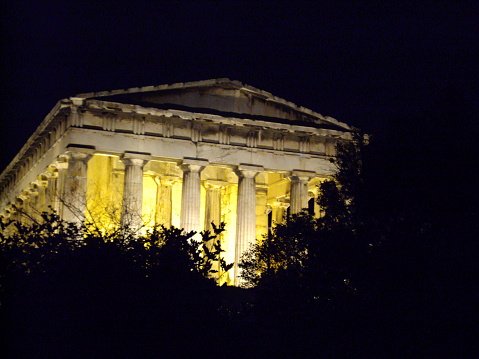America’s founding principles are not merely tried—they are true.
Metastatic Liberalism

Enlightenment rationalism cannot even deliver the goods it promises.
I generally agree with the core claims put forward in Yoram Hazony’s article. The liberal tradition he describes, which has become dominant in the modern West, is dangerously self-destructive. Contrary to the claims of some liberals and anti-liberals alike, we need not consider ourselves “stuck” with this liberalism—as if the only available alternatives are the even crazier and more destructive ideologies of fascism and Marxism. The reasonable alternative to this liberalism is the conservative tradition that—though rooted in ancient sources like the Bible and classical political philosophy—is still available to us today, if only we will seriously reconsider it.
Thus sympathizing with Hazony’s general attitude, I would like to expand upon it according to my own understanding of the issues. I will begin by adding some reflections on the specific ways in which liberalism is failing and why it is failing. I will conclude by offering what I think is an important clarification about the conservative tradition that Hazony presents as the sensible alternative to our reigning but decadent liberalism.
Modern liberalism of the kind Hazony indicts fails on its own terms in three key respects. Moreover, in each case, liberalism fails not accidentally, but because of defects in its own theoretical and moral foundations. Liberal societies are decaying not because of assaults from without, mounted by alien ideologies. Rather, they are decaying because of their natural tendency toward decadence.
In the first place, liberalism promises individual freedom. It fails in the end to secure this freedom, however, unless buttressed by other older systems of thought such as nationalism and religion. Liberalism on its own cannot furnish a complete understanding about what is good for human beings: instead, it elevates comfortable self-preservation as the most compelling human aim and as the purpose of rightly constituted government. Liberalism unsupported thus takes a partial truth—the desirability of comfortable self-preservation—and makes it the foundational truth for human beings and political communities. This is a serious error. Every civilized person knows that there are things worth suffering and even dying for. Indeed, even barbaric and savage peoples know that there are things worth suffering and dying for. These include some of the goods that Hazony mentions as key to the conservative tradition: family, nation, and God.
Liberalism, then, is based on a false (and low) anthropology. For this reason, it cannot in the end reliably deliver on its promise of freedom. It teaches it subjects to be more and more afraid of suffering and death, with the result that they are willing to part with more and more of their freedom to try to increase their sense of security. Hence the gradual rise of a “nanny state” in many Western nations—a tutelary despotism intended to protect citizens from all possible harm by constraining their choices. The rapid progress of this slavish attachment to self-preservation has been dramatically demonstrated in the last two years, during which whole populations of allegedly free peoples have submitted to all manner of novel and intrusive regulation of their lives (compulsory lock-downs, masking, social distancing, and vaccination) with a view to minimizing the risk from a virus that is not very dangerous to most people.
The defenders of liberalism cannot plausibly say that these measures were mere inconveniences, or that they were trivial impositions on liberty. The anti-COVID measures took away time-honored freedoms. They deprived some people of the ability to earn a living. They disrupted crucial human events—delaying weddings, and preventing people from visiting sick or dying relatives. Prior to 2020, few would have believed that a virus like COVID-19 could have revealed such vast reserves of fear and conformism that exist in nations that claim to be dedicated to freedom.
In the second place, unfettered liberalism promises not only freedom but also happiness for the individual. Liberalism promises to free human beings from what the liberal believes are arbitrary restraints—for example, moral traditions and social hierarchies to which the individual never consented. Liberation from those conventional restraints will make us happy because we will be able to do what we truly want to do, and not have our lives dictated by institutions established in the distant past. More ambitiously, modern liberalism promises to free us not only from such conventional limits but from natural limits as well. The modern liberal state will marshal the powers of science with a view to “the conquest of nature for the relief of man’s estate.” Painful and debilitating diseases will be increasingly eliminated or mitigated.
All of this works—to a certain extent. Liberal societies have provided us with many advantages, and they are truly enjoyable. But this project cannot succeed definitively at making us fully happy in a settled way. This is evident empirically, if we look beyond the parts of the word in which modern liberalism has been dominant. At a conference, I once had an opportunity to talk with a young anthropologist whose particular study was one of the poor nations of Africa. I asked her what was the most interesting or surprising thing about the people there, and she immediately replied: “How happy they are.” Alexis de Tocqueville made a similar observation in his celebrated Democracy in America. Why is a European peasant so happy and an American, with all his freedom, so restless and dissatisfied? Because the latter is haunted and driven by the endless quest for new pleasures, while the former is grateful for whatever he happens to have.
Liberalism unleashes its remarkable transformative power by appealing to our dissatisfaction with the way things are. This is the dynamo by which it is able to work such improvements. These improvements are often quite real. Who wouldn’t be grateful for antibiotics, or for the opportunity to be a member of the middle class instead of being stuck in perpetual serfdom? Nevertheless, the benefits liberalism delivers can never be satisfactory, can never be a ground of settled happiness, because liberalism’s transformative power depends on our permanent discontentedness. And modern liberal peoples are generally discontented. Just look at the anger and bitterness of many people who live in the safest and most prosperous societies that have ever existed.
In the third place, modern liberalism promises self-government or democracy. This promise, too, is failing. Liberalism’s ruling elites claim to be defenders of democracy, but this claim appears more and more to be mere pretense or self-delusion. For example, America’s liberal leaders certainly do not want the voters to decide important questions like the definition of marriage or the extent to which abortion should be permitted. They instead want such questions to be decided by a credentialed elite—liberal lawyers and judges—on the basis of novel interpretations of the Constitution that have no basis in its text or history. Today’s liberal leaders show a disdain for large segments of the population that would have been unthinkable to liberals of one or two generations ago. The most famous example of this disdain is, of course, Hillary Clinton’s dismissal of half of Donald Trump’s supporters—a quarter of the American electorate—as “deplorable and irredeemable.”
Again, this decay in commitment to self-government is not an accident but a necessary development of liberalism’s character. As I suggested above, human beings by their nature want to live for something more elevated than mere comfortable self-preservation. Put positively, human beings know that there are compelling goods which they should serve even to the point of self-sacrifice, such as family and nation, and even a supreme good that deserves their ultimate loyalty, God. But since liberalism deliberately debunks these traditional objects of veneration, it leaves a void in the liberal soul, which then turns to modern substitutes. Hence liberalism’s religious (and fanatical) veneration of the idea of progress toward ever greater freedom, equality, and justice as liberalism understands these things.
This religion of progress, however, necessarily undermines liberalism’s support for democracy. Liberalism cannot tolerate the idea that the people might vote to reverse any of the liberal victories of the past, since this would indicate that “progress” is not inevitable and irreversible and therefore would threaten the worldview that liberalism holds with a religious intensity. The truth of this observation has been evident most recently in the rage with which the children of liberalism greeted the Supreme Court’s decision in Dobbs v. Jackson Women’s Health Organization.
Liberalism regards all the policies that it succeeds in imposing as part of the necessary structure of progressive social justice and therefore as no longer requiring the ongoing consent of the governed. For liberalism, the rise of a popular political movement in opposition to established liberal policies does not call into question the democratic legitimacy of those policies. Rather, it calls into question the legitimacy of that non-liberal political movement itself, which is condemned as being “undemocratic,” even though it seeks power through lawful means and represents the views of tens of millions of voters. Thus liberalism’s commitment to democracy is really conditional to the point of being hollow. What liberalism is really committed to is the permanence of its own power over society.
Eternal Truths
Modern liberalism, then, tends to destroy not only the traditional goods that human beings have always cherished (such as family, nation, and religion) but also the new goods that liberalism promises (freedom, happiness, and self-government). Hazony is therefore correct that we should turn away from liberalism and to the Anglo-American conservative tradition. I would like to note the following point, however. According to Hazony, this conservative tradition differs from liberalism by rejecting liberalism’s foolish and dogmatic claim that autonomous reason can discover universal truths. Although there is truth in this formulation, it needs to be understood precisely. In fact, many of the conservative figures to whom Hazony refers also believed in universal standards of right knowable by human reason. This is certainly true of Americans like Washington and Hamilton, and Englishmen like Burke, Blackstone, and Hooker. All of these men were influenced by the older “natural law” tradition, which holds precisely that there are universal moral principles that reason can grasp.
These conservative thinkers held that there are certain moral duties that are knowable by reason everywhere and at all times—for example, that our fellow humans are not to be murdered, that ties of marriage are to be respected, that parents are to be honored, that knowledge is to be pursued, and that God is to be worshipped. This is, of course, very different from the liberal view that reason teaches us that there is some form of government that is mandatory for all peoples everywhere—to say nothing of the liberal view that reason tells us that we should be liberated from all traditional beliefs as much and as quickly as possible, that we should in the end, be free to create our own identities without limit. The latter conception of reason is a kind of rationalist fanaticism that makes liberalism a menace. But the former, natural law conception of universal reason is necessary to distinguish civilization from barbarism, and tyranny from just government, and therefore must be understood and maintained as part of the conservative tradition.
The American Mind presents a range of perspectives. Views are writers’ own and do not necessarily represent those of The Claremont Institute.
The American Mind is a publication of the Claremont Institute, a non-profit 501(c)(3) organization, dedicated to restoring the principles of the American Founding to their rightful, preeminent authority in our national life. Interested in supporting our work? Gifts to the Claremont Institute are tax-deductible.
Reason and revelation are united in our founding philosophy.
The pitfalls of conservatism without practical reason or natural law.
The Anglo-American alternative to fascism, Marxism, and enlightenment rationalism.




